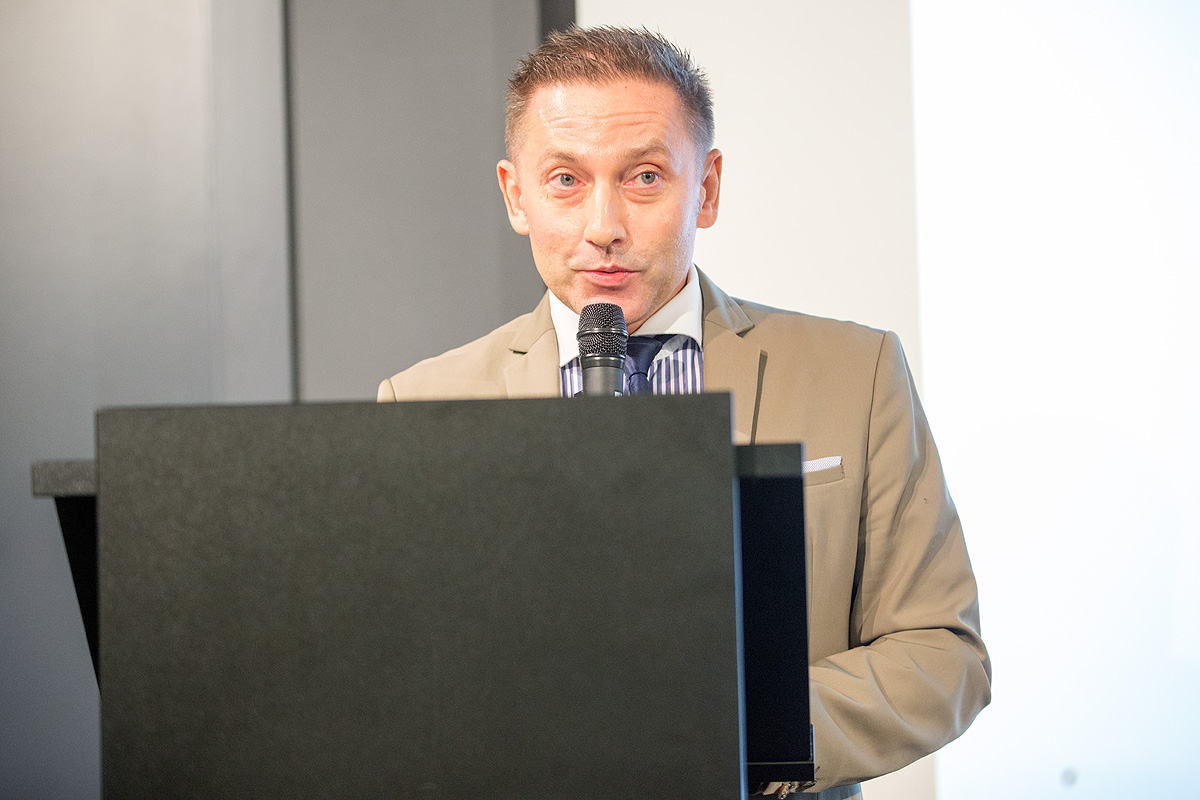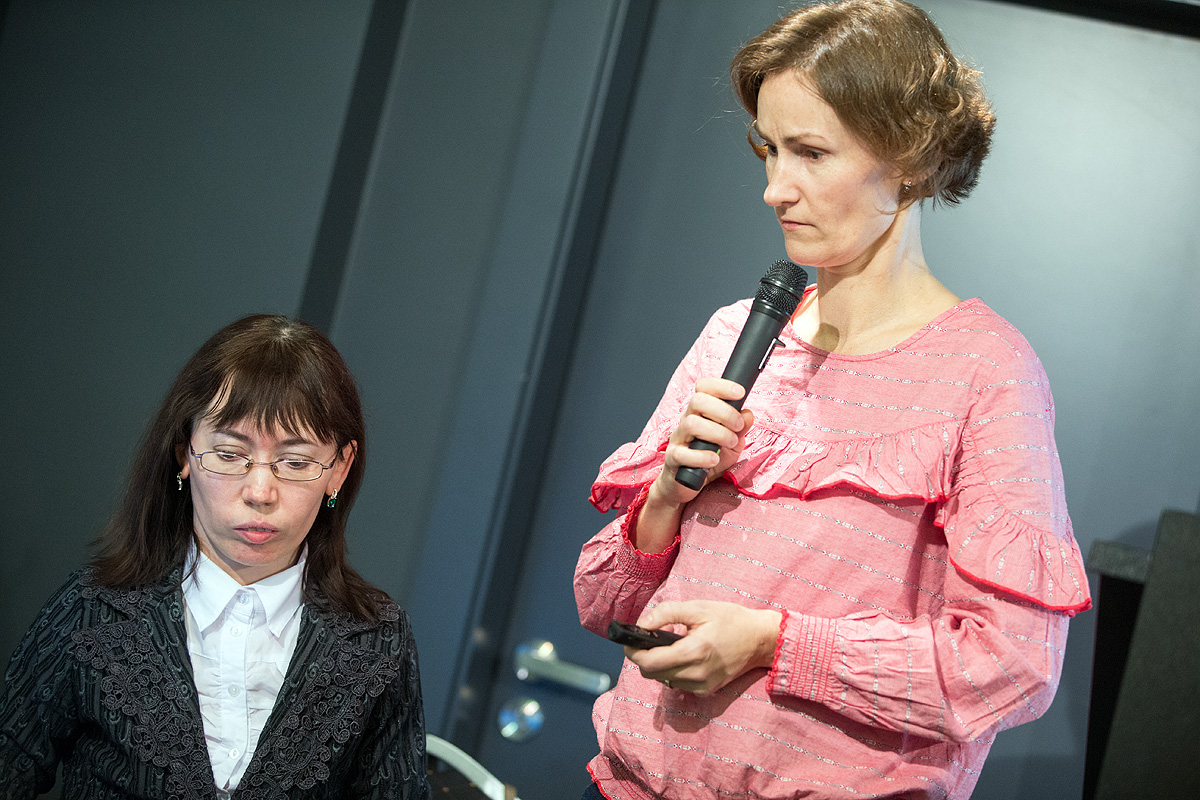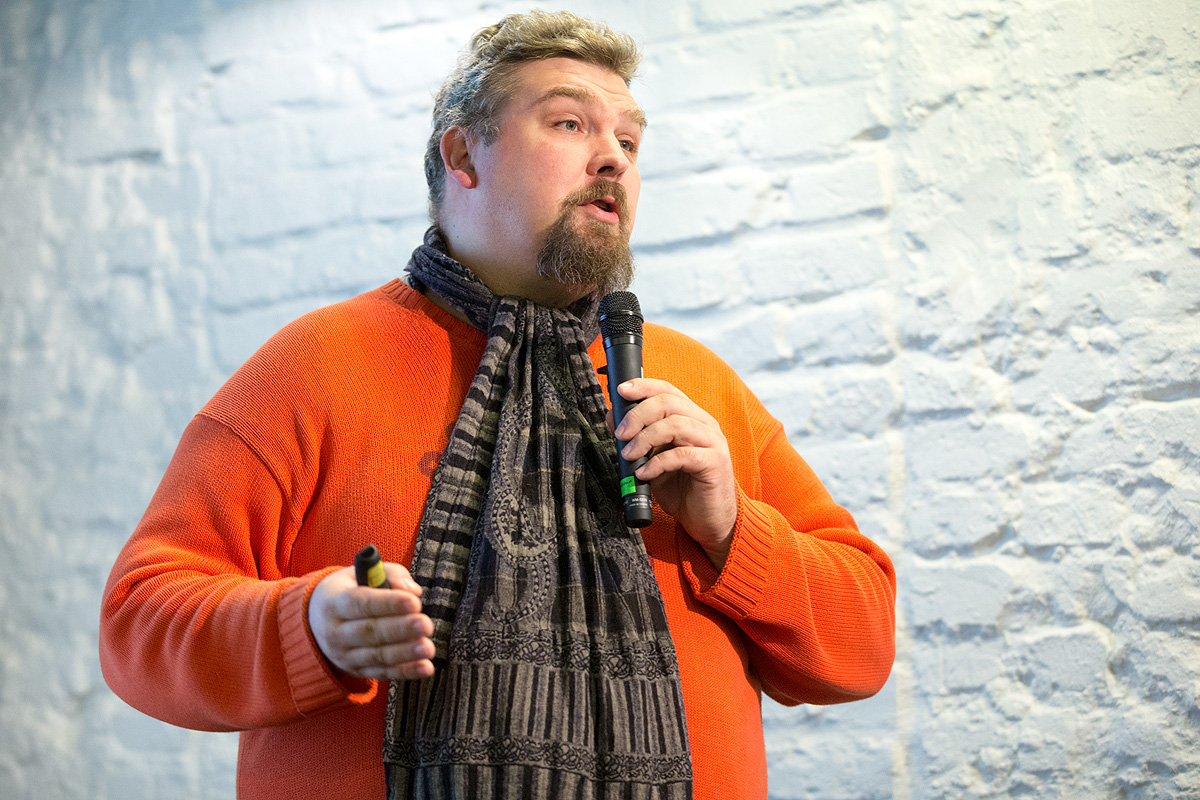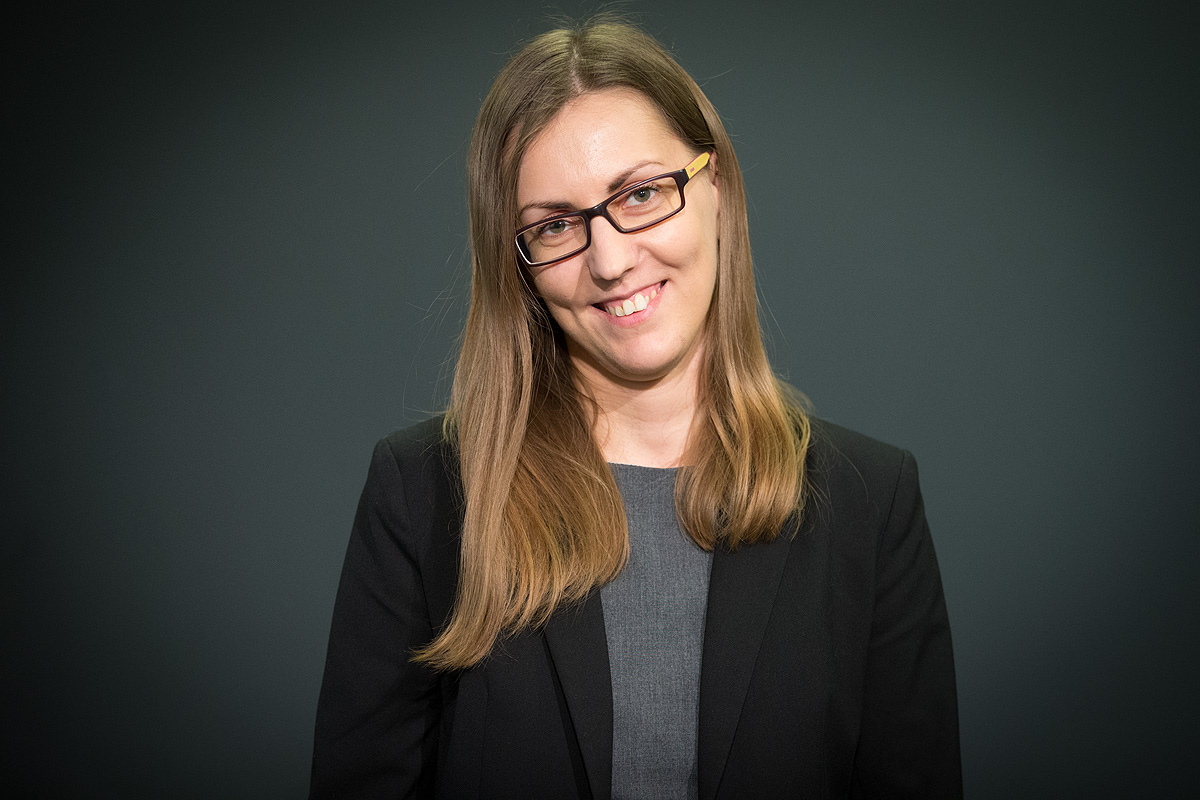On December 8th, 2017 member organizations of the National Equality and Diversity Forum held the national conference “The importance of NGO and state institutions’ cooperation in implementing policy measures against various forms of discrimination”. The conference focused on taking a closer look at organizations’ experiences, particularly those of organizations belonging to NEDF, working with state institutions.
Valerijus Simulik, Chairman of the Parliamentary Human Rights Committee, greeted conference participants on the occasion of International Human Rights Day. The politician emphasized that in conservative Lithuanian society and in a Parliament elected to represent these conservative voters’ interests, effective legislation for human rights remains controversial.
Conference participants were also welcomed by Donatas Butkus, director of the Human Rights Division of the United Nations, International Organizations and Human Rights Department of the Ministry of Foreign Affairs. Butkus emphasized what a meaningful opportunity it was for the Ministry to work together with civic society organizations, especially in the context of the United Nations universal periodic review. According to the director of the Ministry’s Human Rights Division, NGO cooperation with state institutions is an especially important step towards improving the human rights situation.
2017 – a special year for human rights activists in Lithuania
Greeting representatives of NEDF member organizations, national LGBT* rights organization LGL’s Executive Director Vladimir Simonko stated that 2017 has been a special year for Lithuania’s human rights activists. According to Simonko, this year was important for NGO representatives because the Office of the Parliamentary Ombudspersons was accredited as a National Human Rights Institution. National Human Rights Institutions are an integral part of the national and international legal system, because they ensure that the state implements international regulations in the human rights sphere.
LGL’s Executive Director reminded participants that although Lithuania’s National Human Rights Plan was presented in 2002, the state has currently still not managed to effectively ensure the plan’s implementation. Simonko was hopeful that the newly accredited institution, upon beginning its work, would undertake new plans to systematically ensure human rights in Lithuania in the wider national and international context.
The NEDF representative also shared the good news that two coalitions of human rights organizations, NEDF and CHRO, had taken major steps toward official registration as NGO coalitions, and expressed hope that NEDF would continue its successful work with the National Human Rights Institution, human rights monitoring Ombudspersons and the Ministry of Foreign Affairs. “I hope that this conference will be another impetus for closer cooperation between NGOs and state institutions,” LGL’s Executive Director concluded.
Disability NGO’s experience cooperating with municipal institutions
During the NEDF conference, Klementina Gečaitė, project manager of the Lithuanian Disability Forum, and two of the organization’s volunteers, Irmina Beneševičiūtė and Kristina Dūdonytė, discussed the organization’s experience working with Lithuanian municipal institutions.
The LDF representatives presented the organization’s 2014-15 pilot project “Strengthening cooperation between disability NGOs and state institutions and improving services for the disabled community”, during which the AGENDA 50 model for cooperation between disability NGOs and state institutions was adopted in Lithuania, improving conditions and opportunities for cooperation between these organizations and presenting the model in 20 municipalities in Lithuania, with a pilot taking place in 5 municipalities: Vilnius, Kaunas, Alytus, Radviliškis and Pasvalys.
The AGENDA 50 model adapted by LDF is distinguished by its handling of disability through a human rights prism, equally weighted partnership between NGOs and state institutions, and consecutive strategic planning. With this project, LDF seeks to develop organized and focused policies on disability issues, in the interest of implementing regulations ordered by the UN Convention on the Rights of Persons with Disabilities.
According to reports from a study performed in 2015 on cooperation between disability NGOs and the state sector, in pursuing equivalent partnerships, municipal institutions also struggle with NGOs’ inter-organizational cooperation, conflicts of interest and a shortage of human resources, and NGOs face barriers in terms of lack of funding from municipal institutions, residual based finance plans for NGO projects, and difficulty reaching mutual understanding.
The LDF representatives emphasized that the most appropriate way to solve this problem is through enabling dialogue between NGO directors, people from the disabled community, and those involved in building social policy that addresses the needs of marginalized groups. “We can assume based on LDF’s practical experience that when representing the interests of those with disabilities, it’s critical to have initiative and motivation to contribute to the well-being of society. However, those involved in forming social policies also must be open to the issues of people with disabilities, respond to their needs and be able to form partnerships,” the speakers said.
Best practices for cooperation between NGOs and Ombudspersons carrying out human rights monitoring
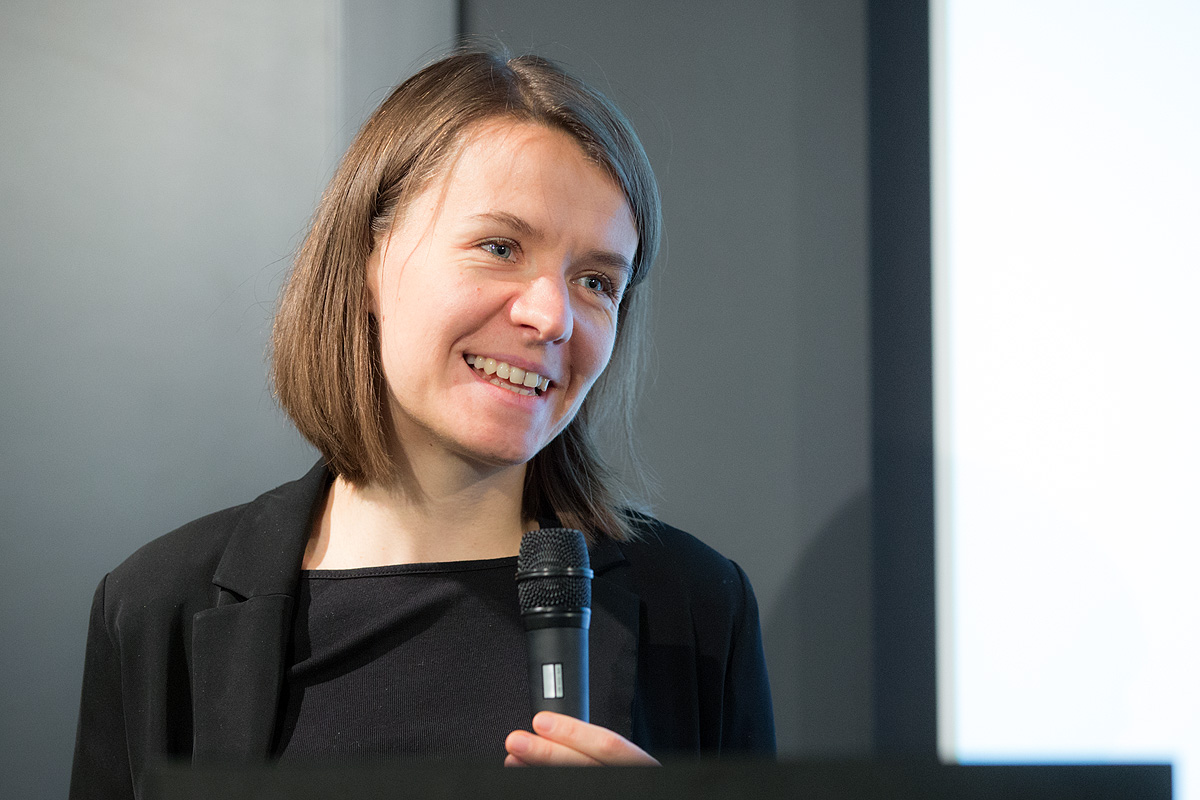
Mintautė Jurkutė, Communications Manager for the Office of the Equal Opportunities Ombudsperson @Augustas Didžgalvis
Mintautė Jurkutė, Communications manager for the Office of the Equal Opportunities Ombudsperson, shared her institution’s experiences working with NEDF member organizations. The Communications director reminded conference participants that since 2010 the Office, working together with NEDF, has implemented 7 projects. She also stated that her Office’s direct cooperation with this coalition of NGOs allows them to share knowledge and experiences that can be used to directly reach marginalized groups and ensure effective mutual communication.
As examples of cooperation between her office and NEDF, Jurkutė referred to events organized in 10 regions of Lithuania: “Equality Day” events held in public spaces, games and discussions held in schools, and meetings with representatives of businesses, the academic community, state workers, NGOs and professional unions.
Jurkutė also presented the results of a series of workshops organized in the context of a collaborative project between NEDF and the Ombudsperson’s Office, during which project partners visited each NEDF member organization and became acquainted with struggles faced by the marginalized groups that each organization represents. “It was great to see how representatives of NEDF organizations positively dealt with the issue of who would organize these wonderful experience-exchanging workshops, at the same time gaining wider understanding of the human rights issues that exist in Lithuania and becoming more conscious of other social groups’ perspective,” she said confidently of the project.
Another great example of cooperation between NEDF and the Office of the Equal Opportunities Ombudsperson is their collaborative initiative to organize the National Equality and Diversity Awards. Since 2014, when the awards ceremony was organized for the first time, 37 people, organizations, ideas, projects, initiatives and actions have been recognized for their contribution to the spread of equality and diversity in Lithuania.
The secret of Food Bank’s breakthrough
According to Vaidotas Ilgius, the communication and outreach director of Maisto Bankas, the secret of the organization’s success in charity and fundraising efforts that collect food from the community and provide it to disadvantaged people is not submitting requests to state institutions, but suggesting collaborative initiatives and thanking participants for sharing. Ilgius says that thanks to this approach, Maisto Bankas has become the largest charity in Lithuania over 16 years, by 2016 operating in 73 cities and regions, working with 754 social organizations, and donating 7710 tons of food for 11.2 million euro.
“There isn’t a single algorithm for initiating collaboration with state institutions and businesses. You need to suggest something, work with people at the bottom of the chain and effectively increase your organization’s visibility,” he asserted. He held up the organization’s collaboration with grocery chain Iki, which has donated 21.7 million euro worth of food since 2009, as one of its greatest achievements. According to Ilgius, when advertising for support, it’s especially important to clearly and precisely state what this support will be used for and what its concrete benefits will be. By his claims, each euro donated to Maisto Bankas becomes 24 meals for those in need.
Principles of cooperation in National Human Rights Institutions’ activities
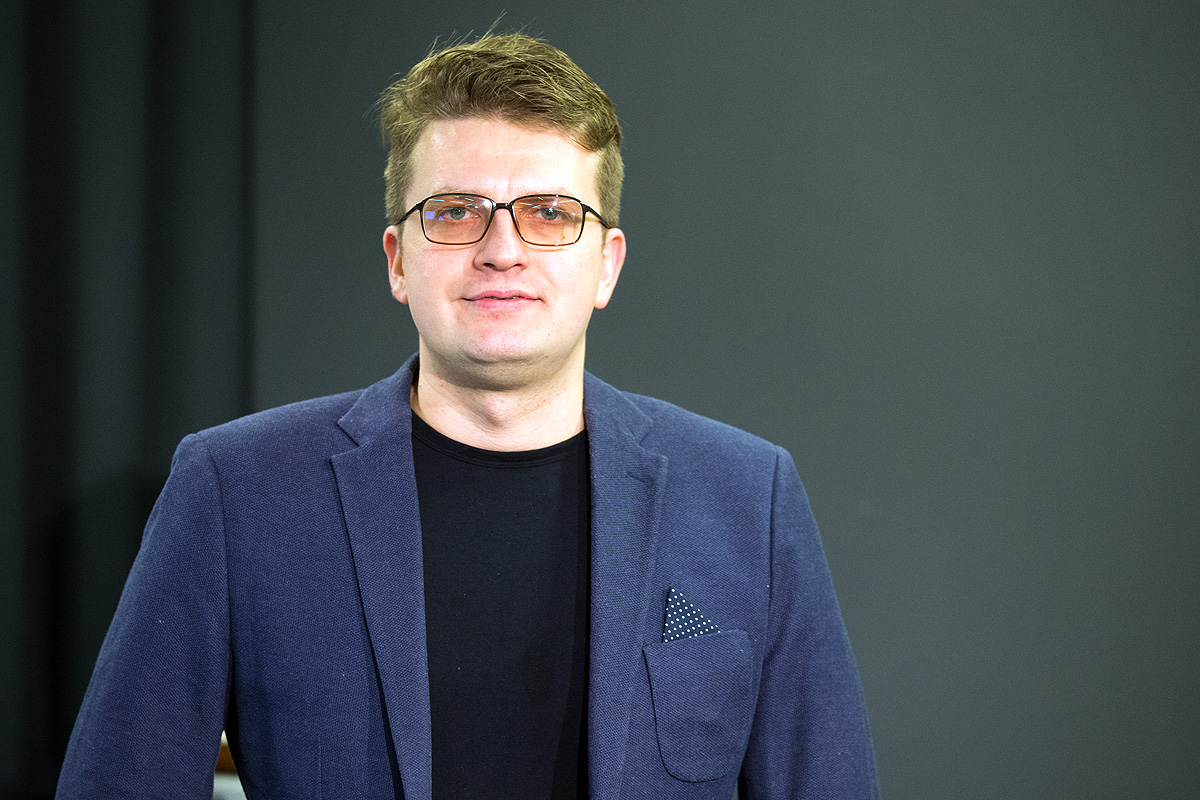
Vytautas Valentinavičius, Chief Consultant at the Parliamentary Ombudspersons’ Office @Augustas Didžgalvis
Vytautas Valentinavičius, chief consultant at the Parliamentary Ombudspersons’ Office, introduced conference participants to the institution’s activities as a National Human Rights Institution. On March 23rd, 2017, the Ombudspersons’ Office was accredited with this position under a decision made by UN Human Rights Accreditation Committee and Global Alliance of National Human Rights Institutions in accordance with the Paris Principles, awarding the office A status.
According to the speaker, in accrediting the office as a National Human Rights Institution, its preparation to receive A status was heavily considered. By awarding A status, GANHRI proposes that the office ensure opportunities to more clearly define mandates that propagate human rights in legislation, as well as develop, formalize and support cooperation with other human rights institutions and civil society.
The representative of the Parliamentary Ombudsperson’s Office emphasized that the Parliamentary Ombudspersons and their employees will carry out the office’s duties as a National Human Rights Institution. These functions will be coordinated by the director of the Human Rights Department, for which legal amendments have been initiated in order to more clearly define the Parliamentary Ombudsperson’s objectives, including human rights in positive public administration to secure human rights and freedoms as well as the promotion of care and respect for those rights and freedoms. Valentinavičius says that in order to determine concrete, relevant problems in the area of protecting human rights and preventing human rights violations, the Ombudspersons would carry out collaborative efforts with state and municipal institutions, civil society, social partners, international organizations and principles.
Best practices for carrying out international volunteer projects and threefold benefits
National LGBT* rights organization LGL’s best practices for carrying out international volunteer projects were also presented at the conference. As volunteer coordinator Kamila Gasinska explained, the organization’s participation in the European Voluntary Service (EVS) has benefited young volunteers as well as the organization and the local LGBT* community.
“Since 2007, LGL has welcomed 18 EVS volunteers from Italy, Turkey, Portugal, Sweden, the Czech Republic, Slovakia, Finland, Germany and Ireland. Involving volunteers in Lithuania’s human rights movement not only allows us to be more open and liberates the local LGBT* community, especially youth, but also encourages active participation in the fight for their own and others’ rights,” the volunteer coordinator said.
She stated that the main objective of LGL’s ongoing international volunteer project is to combine the organization’s many years of experience with volunteers’ ideas and creative decisions while ensuring the integration of LGBT* people in society through initiatives promoting visibility and participation in the democratic process (especially for youth).
At LGL, EVS volunteers, working together with those experienced in the LGBT* rights movement and local volunteers, share their knowledge, advice and perspectives, at the same time learning, adapting their existing skills and learning new skills that help them determine their direction upon returning to their home country and the wider EU work market. International volunteer projects also focus, mobilize and empower LGBT* youth in Lithuania, making a direct impact on youth visiting the local LGBT* community center, and motivate them to get involved in the organization’s activities and take action in the fight for their rights by implementing their ideas.
Gasinska also noted that efforts carried out by EVS volunteers – for example, assistance organizing conferences, events organized as part of Baltic Pride or Rainbow Days, community strengthening events and informational campaigns – strengthen the organization’s experience working with youth by bringing in new ideas and perspectives, attract more visitors to the LGBT* community center, and contribute to the organization’s visibility efforts and formation of a positive image of the LGBT* community during various campaigns.
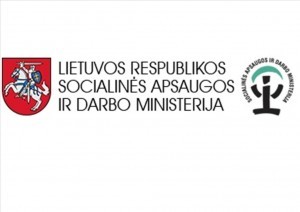 This article is produced and published under the framework of the NEDF Institutional Development Project No. (2017) NOBR-135, supported by the Ministry of Social Security and Labor of the Republic of Lithuania.
This article is produced and published under the framework of the NEDF Institutional Development Project No. (2017) NOBR-135, supported by the Ministry of Social Security and Labor of the Republic of Lithuania.

![@[130078563815512:Augusto Didžgalvio fotografija]](https://www.lgl.lt/en/files/SLR-037931-356x237.jpg)
